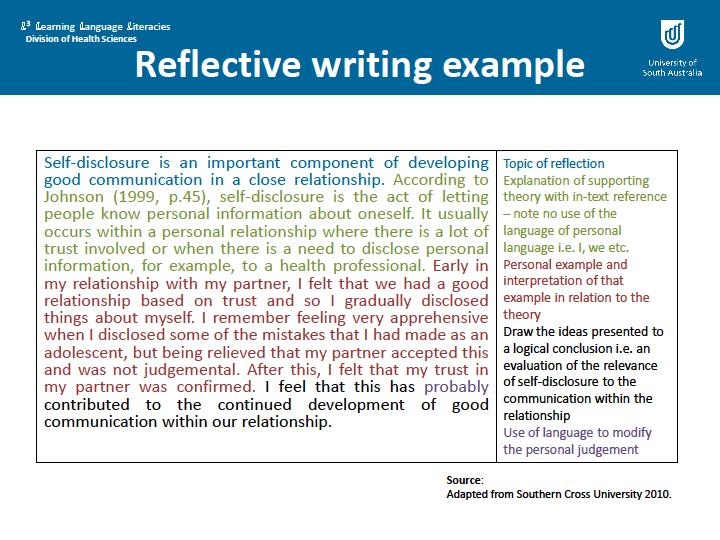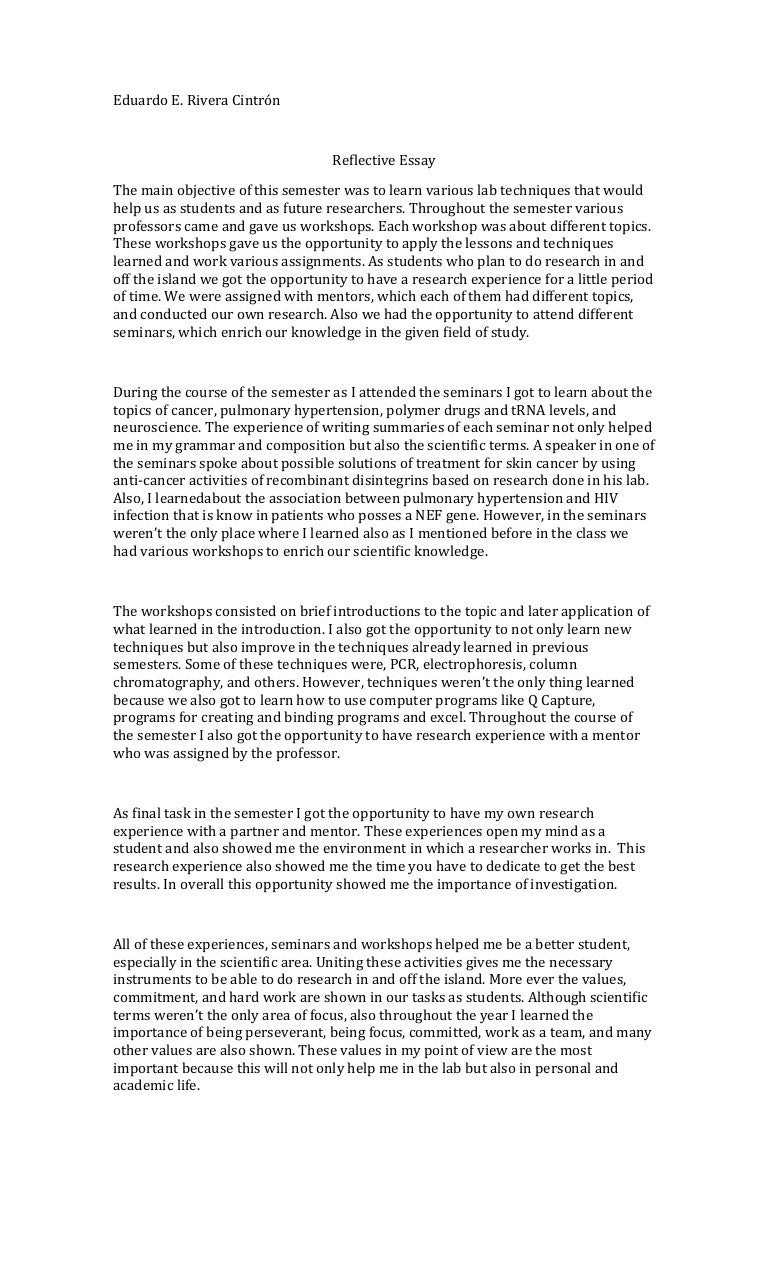
2 A short guide to reflective writing What is reflection, and why is it important? Reflection is a purposeful activity in which you analyse experiences, or your own practice/skills/responses, in order to learn and improve. Reflection in academia We reflect quite naturally in our day to day lives, thinking about things that have happened, whyFile Size: KB A reflective essay is a written piece of literature that focuses on presenting and narrating a person’s experience and how it becomes an instrument towards a change of perception in life. It is a way for a writer to share an important event in his/her life and how it affected him/her so that others may learn something from it As Wikipedia defines it, a reflective writing “is an analytical practice in which the writer describes a real or imaginary scene, event, interaction, passing thought, memory, form, adding a personal statement reflection on the meaning of the item or incident, thought, feeling, emotion, or situation in his or her life.”
Reflective Writing Guide | UNSW Current Students
A great deal of your time at university will be spent thinking; thinking about what people have said, what you have read, what you yourself are thinking and how your thinking has changed. It is generally believed that the thinking process involves two aspects: reflective thinking and critical thinking. They are not separate processes; rather, they are closely connected Brookfield Figure 1: The Thinking Process adapted from MezirowSchonBrookfield There is neither a right nor a wrong way of reflective thinking, there are just questions to explore.
Figure 1 shows that the reflective thinking process starts with you. Before you can begin to assess the words and ideas of others, you need to pause and identify and examine your own thoughts.
Doing this involves revisiting your prior experience and knowledge of the topic you academic reflective writing exploring, academic reflective writing. It also involves considering how and why you think the way you do, academic reflective writing.
The examination of your beliefs, values, attitudes and assumptions forms the foundation of your understanding. Reflective thinking demands that you recognise that you bring valuable knowledge to every experience. It helps you therefore to recognise and clarify the important connections between what you already know and what you are learning. It is a way of helping you to become an active, aware and critical learner. Skip to main content. myUNSW Moodle Library Handbook Email. Current Students.
Sign on Search Menu, academic reflective writing. Student Home Getting Started Accept your offer How to enrol Student ID card Set up your IT Orientation Week. Exams Results.
The Nucleus: Student Hub. Psychology Health Service. Accommodation Health services Sport and gym. Moodle myUNSW Email Microsoft Office myLibrary Careers portal Change your password Need help? Student Support Academic Skills Writing skills Essay and assignment writing Print to PDF.
Figure 1: The Thinking Process adapted from MezirowSchonBrookfield Reflective thinking Reflection is: a form of personal response to experiences, situations, events or new information. a 'processing' phase where thinking and learning take place. What is reflective writing? Reflective writing is: documenting your response to experiences, opinions, events or new information communicating your response to thoughts and feelings a way of exploring your learning an opportunity to gain self-knowledge a way to achieve clarity and better understanding of what you are learning a chance to develop and reinforce writing skills a way of making meaning out of what you study Reflective writing is academic reflective writing just conveying information, instruction or argument pure description, though there may be descriptive elements straightforward decision or judgement, e.
about whether something is right or wrong, good or bad simple problem-solving a summary of course notes a standard university essay. See next: How do I write reflectively? Referencing, writing and academic reflective writing skills academic reflective writing. For development of skills needed to succeed at uni. Academic Skills Referencing. Essay and assignment writing. Essay and assignment planning, academic reflective writing.
Answering assignment questions. How do I write reflectively? Examples of reflective writing. Engineering and science. Other links and resources. Reading and note-taking. Contacts and appointments. Back to top. Website Feedback Contacts Sitemap A-Z Guide. UNSW Sydney NSW Australia Authorised by Deputy Vice-Chancellor Academic UNSW CRICOS Provider Code: G TEQSA Provider ID: PRV ABN: 57 Page last updated: Monday 23 December
How to write a Reflective Essay
, time: 3:28Examples of Reflective Writing | UNSW Current Students

A reflective essay is a written piece of literature that focuses on presenting and narrating a person’s experience and how it becomes an instrument towards a change of perception in life. It is a way for a writer to share an important event in his/her life and how it affected him/her so that others may learn something from it Reflective Writing A great deal of your time at university will be spent thinking; thinking about what people have said, what you have read, what you yourself are thinking and how your thinking has changed. It is generally believed that the thinking process Apr 03, · Reflective essays can be academic, or may feature more broadly as a part of a general piece of writing for a magazine, for instance. For class assignments, while the presentation format can vary, the purpose generally remains the same: tutors aim to inspire students to think deeply and critically about a particular learning experience or set of experiences
No comments:
Post a Comment